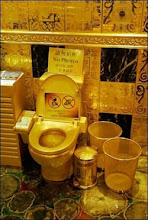
The Golden Latrine is old enough to remember those glorious days, way back when, when life was all rosy-cheeked children playing football in the street and fry-ups and chatting to Nora from the lauderette down the labour exchange.
But how different life is now compared to that golden past - at least according to PM David Cameron, who is adamant that the nation is in the grips of a full-blown moral crisis.
In case you missed it, Tony Blair recently
penned a piece on the UK riots in
The Observer, in which he argued that the riots were down to a relatively small number of highly dysfunctional, asocial households which are atypical of Britain as a whole. As Blair put it:
The left says they're victims of social deprivation, the right says they need to take personal responsibility for their actions; both just miss the point. A conventional social programme won't help them; neither – on its own – will tougher penalties. The key is to understand that they aren't symptomatic of society at large.
This seems to me an eminently sensible analysis. Study after study has shown that prison doesn't work, but neither does sending in a single social worker once a week. Wholesale '
family intervention' is required. And to be fair to Cameron, he seems to agree,
vowing to turn round the lives of 120,000 troubled families by 2015.But there was a very definite disagreement about what the riots
meant. Blair concluded his
Observer piece:
Elevate this into a highfalutin wail about a Britain that has lost its way morally and we will depress ourselves unnecessarily, trash our own reputation abroad, and worst of all, miss the chance to deal with the problem in the only way that will work.[my emphasis]
However, David Cameron remained unconvinced. Responding to Blair in an interview on the
Today programme, Cameron insisted that Blair was wrong, and that the moral malaise was far more widespread:
In the riots there was clearly a hardcore of people who were just breaking the law and had no sense of right and wrong or moral boundaries. But, tragically, we also saw people who were drawn into it, who passed the broken shop window and popped in and nicked a telly.
And that is a sign of actual moral collapse, of failing to recognise the difference between right and wrong. So I don't think you can simply say this is just a criminal underclass and no other problem at all. I think it does go broader than that.
The mistake Cameron makes, it seems to me, is in treating rioting and looting as the same thing. While the hardcore rioters may well have been the troubled families Blair (and Cameron, for that matter) believes we need to target - aided and abetted by the odd bored student - plenty of people helped themselves to a free t-shirt or widescreen television. Evidence of a far-reaching moral malaise? Or just a reminder of a basic article of human nature: if we can get something for free, we will?
Remember the cases of the
cash machines malfunctioning and giving out free money? There's been numerous cases of queues of well-balanced, middle-class people queuing round the block with their children for their handout.
In many ways Cameron's
Today interview was just a reprisal of
this speech made in August, in which he talked about the coalition tackling "the slow-motion moral collapse that has taken place in parts of our country these past few generations". Buying into the myth of moral decline seems to be an occupational hazard for Tory PMs - Thatcher frequently pined for "Victorian values", seemingly oblivious to the fact her allegiance to free market economics was dissolving those very community values.
So whenever we feel tempted to start seeing the riots as omens of the forthcoming apocalypse, let's just remember: none of this is new. 2000 people helping themselves to some free trainers is not the end days. The fear of feral youths and teenage gangs is a phenomenon that is centuries old. Let's try and keep some perspective, yes?




